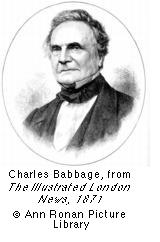 Charles Babbage's father was a managing partner in the London bank Praed, Mackworth & Babbage. The young Charles lived his first years in London, but his father sold out his partnership and retired to the country.
Charles Babbage's father was a managing partner in the London bank Praed, Mackworth & Babbage. The young Charles lived his first years in London, but his father sold out his partnership and retired to the country.Mathematician and inventor, b. 26 December 1791 (London, England), d. 18 October 1871 (London).
 Charles Babbage's father was a managing partner in the London bank Praed, Mackworth & Babbage. The young Charles lived his first years in London, but his father sold out his partnership and retired to the country.
Charles Babbage's father was a managing partner in the London bank Praed, Mackworth & Babbage. The young Charles lived his first years in London, but his father sold out his partnership and retired to the country.
From his early years Babbage was fascinated by automata, spring-operated robots that simulated humans dancing, bowing and performing other graceful movements. One of these amazing feats of mechanical engineering later became the centrepiece of his house.
In 1810 Babbage entered Trinity College in Cambridge, being interested chiefly in mathematics. English mathematicians had been reluctant to take up Leibnitz' notation, which had hindered progress in differentiation and analytical algebra. In 1812 Babbage helped establish the Analytical Society, which set itself the task of introducing mathematics of the continent into England.
Babbage's achievements as a young mathematician must have been outstanding. In his autobiography he describes his disappointment with the standard of mathematical science in Cambridge, where the tutors were not even interested in his probing questions. In 1816 he was elected a fellow of the Royal Society of London. In 1820 he was a driving force in the founding of the Royal Astronomical Society, and in 1834 he participated in the founding of the Statistical Society.
Babbage's fame, however, derives from his decision to build a mechanical calculator and later a mechanical computer. The Astronomical Society used tables of logarithms to produce astronomical tables, which not only took many people several years of calculations but were also full of errors. Having the tables calculated by a machine would eliminate errors and possibly speed up the process. In 1822 Babbage presented his plan to the Royal Astronomical Society:
In 1823 the government gave Babbage 1,500 pounds to build a mechanical calculator. His "difference engine" produced many new hights of precision engineering and consumed over 17,000 pounds of government money and much of his private fortune. But Babbage rarely completed a task. His mind was soon attracted to a new problem. Work on the difference engine came to a standstill in 1833, and the project was officially abandoned in 1842.
The project that caught Babbage's attention from 1833 was the "analytical engine", a machine that could be programmed to perform a range of calculations and keep results in memory for later use. He collaborated on the machine with Ada King until her death in 1852.
Babbage was a remarkable person even for his time of excitement about everything technical and scientific. In 1818 he submerged in a cast iron diving bell and became interested in submarine navigation. He descended at the end of a rope into Mount Vesuvius with a barometer. He was appointed professor at Cambridge but never gave a lecture. He was offered a knighthood but turned it down, saying that it was not a fitting reward for a scientist. A complete list of his ideas and experiments would fill a separate lecture.
In his last years Babbage claimed that street musicians, particularly organ-grinders, interfered with his work and tried to still them at any occasion. The historian B. V. Bowden reported that as a result
When he died street musicians from all over London assembled in his street to harass him; the obituary in the Times said that he lived to almost eighty "in spite of organ-grinding persecutions."
Shurkin, J. (1984) Engines of the Mind. W. W. Norton & Company, New York.